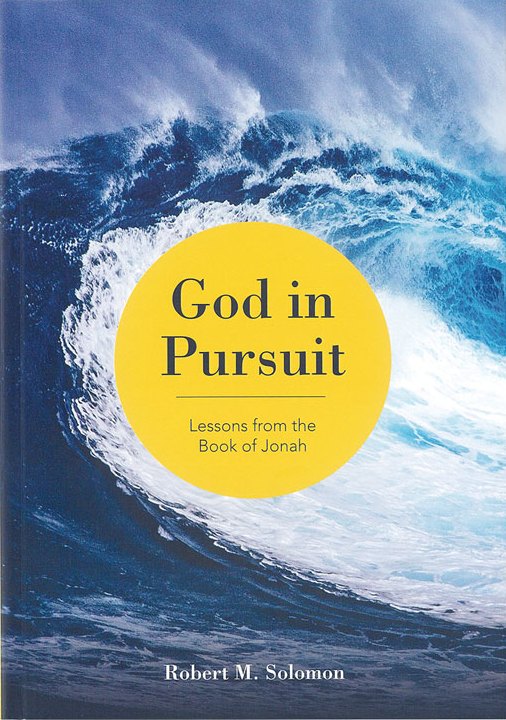By Robert M. Solomon, Bishop of the Methodist Church in Singapore from 2000 - 2012

PHOTO: American Psychiatrist Karl Menninger wrote a book entitled Whatever Became of Sin? [1a] He observed that modern society had abandoned the word "sin" from its common vocabulary. Behaviour once attributed to human sinfulness was now seen as the result of physical or psychological illness. Even as a secular psychiatrist, Menninger was alarmed that pastors were doing the same thing, hence the book.
Perhaps we think that in the church we still talk about sin. That is good. But how seriously do we take sin? I once watched a newsclip of New Year's celebrations in Singapore. Among the showbiz personalities on stage was a man wearing a T-shirt that read "I (LOVE) SIN". While I assume that "SIN" was short for "Singapore", I suspect that a sly pun was intended. A hedonistic (devoted to the pursuit of pleasure) message was hidden behind a show of national pride. Has "sin" returned to our vocabulary, but now as a cool word we celebrate?
Such secular trends can influence the church. Do we truly take sin seriously? When cancer is diagnosed, for instance, it is dealt with immediately, aggressively, and urgently. We take cancer very seriously because it is a deadly disease, and if not dealt with decisively, it will destroy us. But our respond to sin often lacks the same urgency. While cancer can destroy the body, sin can destroy our whole being. It is like a cancer of the soul, far more dangerous than other kinds of cancer. Shouldn't we be deadly serious about sin?
The early church took sin very seriously indeed. The fact that they developed a list of deadly sins speaks volumes of how well they understood the devastating effects of sin. The Geek monastic theologian Evagrius of Pontus is said to have listed eight deadly sins in the fourth century. In the sixth century, Pope Gregory the Great reduced the list to seven deadly sins, possibly for pastoral reasons - helping Christians to use each day of the week to reflect on one deadly sin.
This list is in follows: pride (Sunday), envy (Monday), anger (Tuesday), apathy (Wednesday)(lack of feeling or emotion), greed (Thursday), gluttony (Friday, hence the tradition of fasting or abstinence on Friday), and lust (Saturday). Through the centuries, the church has accumulated much wisdom regarding these sins - what they are, how they infect the soul, what forms they take, how they mask themselves as false piety, how they are related to one another, and how they are to be dealt with. This includes the practice of the opposite virtues - humility, kindness, patience, diligence, generosity, abstinence, and chastity.
Unfortunately, much of the church's wisdom remains untapped by modern-day Christians. Part of the reason may be a lack of seriousness with regard to sin. There may be other reasons too. Prosperity theology is one. If people enter the church in pursuit of the good life, comfortable and pain free, if they participate in the Christian life as self-centred consumers, seeking material blessing instead of a cure for their sin, it is unsurprising that they would not take sin seriously. Given that the biblical gospel addresses the key human problems of sin and death, why does so much of today's audience-driven preaching talk about everything else other than these?
If there is one thing God hates, it is sin. He takes sin very seriously because it goes against all that He is. Sin separates people from God and from one another. It is for our sins that Christ died on the cross (1 Corinthians 15:3). Every time we look at the cross, we must be reminded of the deadliness of sin.
The season of Lent is a good time for an extensive spiritual check-up. We must find out how far we have been infected with the deadly disease of sin. Self-flattery must go, for it prevents us from noticing and getting rid of our sin (Psalm 36:2). How much pride is still intact in our lives? Do traces of it remain in the best of our plans, words, and actions? How about the other deadly sins? Perhaps we could use Lent to find fault - not with others, as we often do, but with ourselves. As the Lord said: "Why do you look at the speck of sawdust in your brother's eye and pay no attention to the plank in your own eye?" (Matthew 7:3). If we do notice the plank in our eye, then by God's grace, we must remove it (Matthew 7:5).
There is much to learn from classic Christian literature on dealing with sin, especially the deadly sins. But to do this well, we must first have the right attitude: we must be serious about our sinfulness.
When a patient is being treated for cancer, it is often obvious to others. Aggressive surgery is common place. If chemotherapy is employed, the patient usually loses hair. These signs tell us that cancer is deadly, a serious matter to patients and their doctors, since drastic actions are being taken to deal with the disease.
Could the same thing be said of sin, the cancer of the soul? Have we been taking this deadly condition seriously? Are there signs that we are "under treatment" - that drastic measures are under way to deal with it? Let us get serious about sin.
https://blogger.googleusercontent.com/img/b/R29vZ2xl/AVvXsEj4yLG_0PTImG7SFRib7sbYbQTx5El84iPLWDhw1Hsy_5W3TWO5ArWh5aOfOoZbJQaqsMo1zxZPCBAyhItIw2SFjfgRO9KFzkzKKYfLPbDVqpl3xytpXIFpDjw8uewt8odZcoL6OToEbVH4qJ5u668lRtHvWaS1JMF3lxIjvAtSZPNWkFIB3n_FLMBGFP4/s1000/ALL-small_1.jpg
https://www.australiaunwrapped.com/wp-content/uploads/2021/07/ALL-small.jpg
https://www.australiaunwrapped.com/the-seven-deadly-sins-in-day-to-day-life-catholic-list/
American Psychiatrist Karl Menninger wrote a book entitled Whatever Became of Sin? [1a] He observed that modern society had abandoned the word "sin" from its common vocabulary. Behaviour once attributed to human sinfulness was now seen as the result of physical or psychological illness. Even as a secular psychiatrist, Menninger was alarmed that pastors were doing the same thing, hence the book.

PHOTO: American Psychiatrist Karl Menninger wrote a book entitled Whatever Became of Sin? He observed that modern society had abandoned the word "sin" from its common vocabulary. Behaviour once attributed to human sinfulness was now seen as the result of physical or psychological illness. Even as a secular psychiatrist, Menninger was alarmed that pastors were doing the same thing, hence the book.
Picture posted by RRAuction
https://blogger.googleusercontent.com/img/b/R29vZ2xl/AVvXsEg_2wLhdHLwQuJhmnQfNpH2Bst7W_IW6lNVTJJYBOWAZep528EkAGEL3Hg48w5d33l_DyHo_cBWe5Fl2xrwyaGR5XmP40usBRvUkOqW0FG0HaibBLllploxyQHK7sugEbiUE_vr-lc8_8wQ_Ye7Uq30V4dQ5c9ttwimOsCF6ld3mYjC0vrh_nHYDAlAArA/s2032/3466019_2.jpg
https://d2skn5554g4boz.cloudfront.net/2020-website/659/3466019/large/3466019_2.jpg
https://www.rrauction.com/auctions/lot-detail/346601906590286-karl-menninger-4-signed-photographs
Perhaps we think that in the church we still talk about sin. That is good. But how seriously do we take sin? I once watched a newsclip of New Year's celebrations in Singapore. Among the showbiz personalities on stage was a man wearing a T-shirt that read "I (LOVE) SIN". While I assume that "SIN" was short for "Singapore", I suspect that a sly pun was intended. A hedonistic (devoted to the pursuit of pleasure) message was hidden behind a show of national pride. Has "sin" returned to our vocabulary, but now as a cool word we celebrate?
Such secular trends can influence the church. Do we truly take sin seriously? When cancer is diagnosed, for instance, it is dealt with immediately, aggressively, and urgently. We take cancer very seriously because it is a deadly disease, and if not dealt with decisively, it will destroy us. But our respond to sin often lacks the same urgency. While cancer can destroy the body, sin can destroy our whole being. It is like a cancer of the soul, far more dangerous than other kinds of cancer. Shouldn't we be deadly serious about sin?

PHOTO: Do we truly take sin seriously? When cancer is diagnosed, for instance, it is dealt with immediately, aggressively, and urgently. We take cancer very seriously because it is a deadly disease, and if not dealt with decisively, it will destroy us. But our respond to sin often lacks the same urgency. While cancer can destroy the body, sin can destroy our whole being. It is like a cancer of the soul, far more dangerous than other kinds of cancer. Shouldn't we be deadly serious about sin?
Picture posted by Holly Stewart, Centres For Health & Healing on 28 August 2023
https://blogger.googleusercontent.com/img/b/R29vZ2xl/AVvXsEifXi5xTFSlcX_lTPDNeUsLS6s6h6trjD_WRqdieZS91_ezZ7L2UBLfzNJNOL0yF977y9DQM3Z7L6EpgTGNWgUsxw5ktYcAjaSK2Zr88YwCqfz6YrfTYjqiiF0bgxpeO_bSVNPYnRqAPwbME-APnWJIxAp2quj3nzi-dDeIA4xU2ayPHs6dY5RNzdRny2A/s1500/Depressed-caucasian-millennial-woman-lying-alone-on-bed-and-covering-head-with-pillow-feeling-afraid.jpg
https://cfhh.ca/wp-content/uploads/Depressed-caucasian-millennial-woman-lying-alone-on-bed-and-covering-head-with-pillow-feeling-afraid.jpg
https://cfhh.ca/blog/why-health-anxiety-is-not-talked-about-enough/
The early church took sin very seriously indeed. The fact that they developed a list of deadly sins speaks volumes of how well they understood the devastating effects of sin. The Geek monastic theologian Evagrius of Pontus is said to have listed eight deadly sins in the fourth century. In the sixth century, Pope Gregory the Great reduced the list to seven deadly sins, possibly for pastoral reasons - helping Christians to use each day of the week to reflect on one deadly sin.
This list is in follows: pride (Sunday), envy (Monday), anger (Tuesday), apathy (Wednesday)(lack of feeling or emotion), greed (Thursday), gluttony (Friday, hence the tradition of fasting or abstinence on Friday), and lust (Saturday). Through the centuries, the church has accumulated much wisdom regarding these sins - what they are, how they infect the soul, what forms they take, how they mask themselves as false piety, how they are related to one another, and how they are to be dealt with. This includes the practice of the opposite virtues - humility, kindness, patience, diligence, generosity, abstinence, and chastity.

PHOTO: In the sixth century, Pope Gregory the Great reduced the list to seven deadly sins, possibly for pastoral reasons - helping Christians to use each day of the week to reflect on one deadly sin.
This list is in follows: pride (Sunday), envy (Monday), anger (Tuesday), apathy (Wednesday)(lack of feeling or emotion), greed (Thursday), gluttony (Friday, hence the tradition of fasting or abstinence on Friday), and lust (Saturday). Through the centuries, the church has accumulated much wisdom regarding these sins - what they are, how they infect the soul, what forms they take, how they mask themselves as false piety, how they are related to one another, and how they are to be dealt with. This includes the practice of the opposite virtues - humility, kindness, patience, diligence, generosity, abstinence, and chastity.
Picture posted by Alamy - The seven deadly sins
https://blogger.googleusercontent.com/img/b/R29vZ2xl/AVvXsEgGACPRS-5Tt6zkLLShpiVo2p-3viofLhHjJiepp6QBXAKaOkbIcEG47RYjRrKUW4jLsIeBDrHAP1bPMPJ2uSvATKbGnoVaepxySbYQU_3_QqILTina5gnD9MlX_0a8JUgjqKVAGc1DZ49506Yl_JKRNcOrRj31VBghS4lX0vygYSWcCBqQyp1cj_xiuRE/s1301/colourful-signpost-showing-the-seven-deadly-sins-B0T57H_11.png
https://h7.alamy.com/comp/B0T57H/colourful-signpost-showing-the-seven-deadly-sins-B0T57H.jpg
https://www.alamy.com/stock-photo-colourful-signpost-showing-the-seven-deadly-sins-17741349.html
Unfortunately, much of the church's wisdom remains untapped by modern-day Christians. Part of the reason may be a lack of seriousness with regard to sin. There may be other reasons too. Prosperity theology is one. If people enter the church in pursuit of the good life, comfortable and pain free, if they participate in the Christian life as self-centred consumers, seeking material blessing instead of a cure for their sin, it is unsurprising that they would not take sin seriously. Given that the biblical gospel addresses the key human problems of sin and death, why does so much of today's audience-driven preaching talk about everything else other than these?
If there is one thing God hates, it is sin. He takes sin very seriously because it goes against all that He is. Sin separates people from God and from one another. It is for our sins that Christ died on the cross (1 Corinthians 15:3). Every time we look at the cross, we must be reminded of the deadliness of sin.

PHOTO: If there is one thing God hates, it is sin. He takes sin very seriously because it goes against all that He is. Sin separates people from God and from one another. It is for our sins that Christ died on the cross (1 Corinthians 15:3). Every time we look at the cross, we must be reminded of the deadliness of sin.
Picture posted by Grace Unveiled
https://i.ytimg.com/vi/We-5H7iOUoE/maxresdefault.jpg
https://www.youtube.com/watch?app=desktop&v=We-5H7iOUoE
The season of Lent is a good time for an extensive spiritual check-up. We must find out how far we have been infected with the deadly disease of sin. Self-flattery must go, for it prevents us from noticing and getting rid of our sin (Psalm 36:2). How much pride is still intact in our lives? Do traces of it remain in the best of our plans, words, and actions? How about the other deadly sins? Perhaps we could use Lent to find fault - not with others, as we often do, but with ourselves. As the Lord said: "Why do you look at the speck of sawdust in your brother's eye and pay no attention to the plank in your own eye?" (Matthew 7:3). If we do notice the plank in our eye, then by God's grace, we must remove it (Matthew 7:5).
There is much to learn from classic Christian literature on dealing with sin, especially the deadly sins. But to do this well, we must first have the right attitude: we must be serious about our sinfulness.

PHOTO: There is much to learn from classic Christian literature on dealing with sin, especially the deadly sins. But to do this well, we must first have the right attitude: we must be serious about our sinfulness.
Picture posted by Bible Insideout
https://blogger.googleusercontent.com/img/b/R29vZ2xl/AVvXsEgGOQh7CTX0JFV7oaHBw_4WPcqRjzXHi4TsTZAEgSUPDg7fgi9aVRyGd_D5_5YKdEyk5rEOmYypSctdjlMadn4ZYzLKNzzu-PGl0OO-y74JaQWjH8RFOFUMCxNovFyjqVqvDheEXmDeM8UniB2yqdjiu48c0yAheJjr4zYhvfo_FVuhJTgDZiNA1ghdBas/s1024/Bible-Verses-About-No-Sin-Is-Greater-Than-the-Other1.jpg
https://bibleinsideout.com/wp-content/uploads/2024/02/Bible-Verses-About-No-Sin-Is-Greater-Than-the-Other1.jpg
https://bibleinsideout.com/bible-verses-about-no-sin-is-greater-than-the-other/
When a patient is being treated for cancer, it is often obvious to others. Aggressive surgery is common place. If chemotherapy is employed, the patient usually loses hair. These signs tell us that cancer is deadly, a serious matter to patients and their doctors, since drastic actions are being taken to deal with the disease.
Could the same thing be said of sin, the cancer of the soul? Have we been taking this deadly condition seriously? Are there signs that we are "under treatment" - that drastic measures are under way to deal with it? Let us get serious about sin.

PHOTO: When a patient is being treated for cancer, it is often obvious to others. Aggressive surgery is common place. If chemotherapy is employed, the patient usually loses hair. These signs tell us that cancer is deadly, a serious matter to patients and their doctors, since drastic actions are being taken to deal with the disease.
Could the same thing be said of sin, the cancer of the soul? Have we been taking this deadly condition seriously? Are there signs that we are "under treatment" - that drastic measures are under way to deal with it? Let us get serious about sin.
Picture posted by Pancypriot Association of Parents and Friends of Pediatric Oncology Unit on Wednesday, 24 April 2024 at 05:22 pm
https://blogger.googleusercontent.com/img/b/R29vZ2xl/AVvXsEjtzF51SGaH-MiUft4bLHOUfYYoLlFb5xihA-q-4LuKizLwTCM1585Q5Ejq6W6KKXGOGVS761C9CWeaL5QJh0KGLKw7ydA4I1znt4sEWGIiGkuHicHONr7iWD3YgDIMAS6Fd2WqZsIkOAGeHkXyfj8EdRhQhZgy8F786Vsph_1KjYOyWIc6_j1ZhMtlVI8/s905/439999738_979689464077343_2978844547067970181_n.jpg
https://scontent.fsin15-2.fna.fbcdn.net/v/t39.30808-6/439999738_979689464077343_2978844547067970181_n.jpg?_nc_cat=100&ccb=1-7&_nc_sid=5f2048&_nc_ohc=-slNLt4FI90Q7kNvgECjv7Z&_nc_ht=scontent.fsin15-2.fna&oh=00_AYBP6f91FAaEil0kfOxxryq_0TgzDTv7mS4bOaV0Uj-2yA&oe=6654C961
https://www.facebook.com/photo/?fbid=979689470744009&set=a.539723778073916&locale=cy_GB

PHOTO: "Dear Lord, we pray that we are taking sin, the cancer of the soul seriously. May we have the right attitude by being serious about our sinfulness.
It is for our sins that Christ died on the cross. Every time we look at the cross, may we be reminded of the deadliness of sin.
May we dealt with sin immediately, aggressively, and urgently. It is like a cancer of the soul, far more dangerous than other kinds of cancer. Sin can destroy our whole being.
We pray for Your help that drastic measures are under way to deal with the deadly sins.
Through Lord Jesus Christ we pray. Amen."
Picture posted by Adobe Stock
https://as1.ftcdn.net/v2/jpg/06/85/38/46/1000_F_685384619_eaA6ORl1Bdiuh0ceOtHoZjT0fpj9Vj4J.jpg
https://stock.adobe.com/search?k=%22two+fists%22&asset_id=685384619
Source (book): "Making All Things New", 52 Reflections to Challenge the Way You Live, Chapter 21, "What Is So Deadly About Sin?", Page 117.
By Robert M. Solomon, Bishop of the Methodist Church in Singapore from 2000 - 2012

Reflection - Faithful to the end (Links)
https://veryfatoldman.blogspot.com/2017/06/reflection-faithful-to-end-links.html
"Finding rest for the soul" Responding to Jesus' Invitation in Matthew 11:28-29, © 2016 by Robert M. Solomon

Reflection - Finding rest for the soul (Links)
https://veryfatoldman.blogspot.com/2018/10/reflection-finding-rest-for-soul-links.html
"God in Pursuit" Lessons from the Book of Jonah, © 2016 by Robert M. Solomon

Reflection - God in Pursuit (Links) - PART I-III, posted on Saturday, 10 August 2019
https://veryfatoldman.blogspot.com/2019/08/reflection-god-in-pursuit-links-part-i.html
"God in Pursuit" Lessons from the Book of Jonah, © 2016 by Robert M. Solomon

Reflection - God in Pursuit (Links) - PART IV, posted on Saturday, 10 August 2019
https://veryfatoldman.blogspot.com/2019/08/reflection-god-in-pursuit-links-part-iv.html
"Songs of Christmas", The Stories and Significance of 20 Well-Loved Carols, © 2018 by Robert M. Solomon

Reflection - Songs of Christmas (Links), posted on Friday, 24 April 2020
https://veryfatoldman.blogspot.com/2020/04/reflection-songs-of-christmas-links.html
"Growing Old Gracefully", Following Jesus to the End, © 2019 by Robert M. Solomon

Reflection - Growing Old Gracefully, Part I - III (Links), posted on Wednesday, 09 December 2020
https://veryfatoldman.blogspot.com/2020/12/reflection-growing-old-gracefully-part.html

Reflection - Growing Old Gracefully, Part IV - V (Links), posted on Thursday, 22 April 2021
https://veryfatoldman.blogspot.com/2020/12/reflection-growing-old-gracefully-part_9.html
"Teach Us to Number Our Days", © 2008 by David Roper

Reflection - Number Our Days, Chapter 1 - 40 (Links), posted on Tuesday, 16 November 2021
https://veryfatoldman.blogspot.com/2021/11/reflection-number-our-days-chapter-1-40.html

Reflection - Number Our Days, Chapter 41 - 64 (Links), posted on Wednesday, 16 March 2022
https://veryfatoldman.blogspot.com/2022/03/reflection-number-our-days-chapter-41.html
 Reflection - He Walks with Me (Links), posted on Tuesday, 16 August 2022
Reflection - He Walks with Me (Links), posted on Tuesday, 16 August 2022https://veryfatoldman.blogspot.com/2022/08/reflection-he-walks-with-me-links.html
"Classic Gem: Timeless Devotions from Our Daily Bread Authors", Copyright © 2021 by Our Daily Bread Ministries

Reflection - Classic Gem, Chapter 1 - 45 (Links), posted on 03 April 2023
https://veryfatoldman.blogspot.com/2023/04/reflection-classic-gem-chapter-1-45.html
"Classic Gem: Timeless Devotions from Our Daily Bread Authors", Copyright © 2021 by Our Daily Bread Ministries

Reflection - Classic Gem, Chapter 46 - 90 (Links), posted on Tuesday, 24 October 2023
https://veryfatoldman.blogspot.com/2023/10/reflection-classic-gem-chapter-46-90.html
[1a] Karl Menninger, Whatever Became of Sin? (Portland, ORL Hawthorne Books, 1973).
New International Version (NIV), Holy Bible, New International Version®, NIV® Copyright ©1973, 1978, 1984, 2011 by Biblica, Inc.® Used by permission. All rights reserved worldwide.
Matthew 7:3 - https://www.biblegateway.com/passage/?search=Matthew+7%3A3&version=NIV
Matthew 7:5 - https://www.biblegateway.com/passage/?search=Matthew+7%3A5&version=NIV
Matthew 11:28-29 - https://www.biblegateway.com/passage/?search=Matthew+11%3A28-29&version=NIV
Psalm 36:2 - https://www.biblegateway.com/passage/?search=Psalm+36%3A2&version=NIV
- https://blogger.googleusercontent.com/img/b/R29vZ2xl/AVvXsEj4yLG_0PTImG7SFRib7sbYbQTx5El84iPLWDhw1Hsy_5W3TWO5ArWh5aOfOoZbJQaqsMo1zxZPCBAyhItIw2SFjfgRO9KFzkzKKYfLPbDVqpl3xytpXIFpDjw8uewt8odZcoL6OToEbVH4qJ5u668lRtHvWaS1JMF3lxIjvAtSZPNWkFIB3n_FLMBGFP4/s1000/ALL-small_1.jpg
- https://www.australiaunwrapped.com/wp-content/uploads/2021/07/ALL-small.jpg
- https://www.australiaunwrapped.com/the-seven-deadly-sins-in-day-to-day-life-catholic-list/
- https://blogger.googleusercontent.com/img/b/R29vZ2xl/AVvXsEg_2wLhdHLwQuJhmnQfNpH2Bst7W_IW6lNVTJJYBOWAZep528EkAGEL3Hg48w5d33l_DyHo_cBWe5Fl2xrwyaGR5XmP40usBRvUkOqW0FG0HaibBLllploxyQHK7sugEbiUE_vr-lc8_8wQ_Ye7Uq30V4dQ5c9ttwimOsCF6ld3mYjC0vrh_nHYDAlAArA/s2032/3466019_2.jpg
- https://d2skn5554g4boz.cloudfront.net/2020-website/659/3466019/large/3466019_2.jpg
- https://www.rrauction.com/auctions/lot-detail/346601906590286-karl-menninger-4-signed-photographs
- https://blogger.googleusercontent.com/img/b/R29vZ2xl/AVvXsEifXi5xTFSlcX_lTPDNeUsLS6s6h6trjD_WRqdieZS91_ezZ7L2UBLfzNJNOL0yF977y9DQM3Z7L6EpgTGNWgUsxw5ktYcAjaSK2Zr88YwCqfz6YrfTYjqiiF0bgxpeO_bSVNPYnRqAPwbME-APnWJIxAp2quj3nzi-dDeIA4xU2ayPHs6dY5RNzdRny2A/s1500/Depressed-caucasian-millennial-woman-lying-alone-on-bed-and-covering-head-with-pillow-feeling-afraid.jpg
- https://cfhh.ca/wp-content/uploads/Depressed-caucasian-millennial-woman-lying-alone-on-bed-and-covering-head-with-pillow-feeling-afraid.jpg
- https://cfhh.ca/blog/why-health-anxiety-is-not-talked-about-enough/
- https://blogger.googleusercontent.com/img/b/R29vZ2xl/AVvXsEgGACPRS-5Tt6zkLLShpiVo2p-3viofLhHjJiepp6QBXAKaOkbIcEG47RYjRrKUW4jLsIeBDrHAP1bPMPJ2uSvATKbGnoVaepxySbYQU_3_QqILTina5gnD9MlX_0a8JUgjqKVAGc1DZ49506Yl_JKRNcOrRj31VBghS4lX0vygYSWcCBqQyp1cj_xiuRE/s1301/colourful-signpost-showing-the-seven-deadly-sins-B0T57H_11.png
- https://h7.alamy.com/comp/B0T57H/colourful-signpost-showing-the-seven-deadly-sins-B0T57H.jpg
- https://www.alamy.com/stock-photo-colourful-signpost-showing-the-seven-deadly-sins-17741349.html
- https://blogger.googleusercontent.com/img/b/R29vZ2xl/AVvXsEgInQu-ZgQHBkZ3b8iOzt1CAPIP03EWtrRefNIKZ1geIOUQLyuhPqQ5-fwCiPQJoxtZqK36tkq4WpjXqKW2cgyT_XXv1KsOK46bwsDxRmcMGX5qeHsDcDmn0qV_11Pj6_H9GNr0yLVIpmW9TJMD0xEuPr_D1HK6w799ovDOQeBB6HfOcEJ_GsEdpoyfMGI/s1280/maxresdefault.jpg
- https://i.ytimg.com/vi/We-5H7iOUoE/maxresdefault.jpg
- https://www.youtube.com/watch?app=desktop&v=We-5H7iOUoE
- https://blogger.googleusercontent.com/img/b/R29vZ2xl/AVvXsEgGOQh7CTX0JFV7oaHBw_4WPcqRjzXHi4TsTZAEgSUPDg7fgi9aVRyGd_D5_5YKdEyk5rEOmYypSctdjlMadn4ZYzLKNzzu-PGl0OO-y74JaQWjH8RFOFUMCxNovFyjqVqvDheEXmDeM8UniB2yqdjiu48c0yAheJjr4zYhvfo_FVuhJTgDZiNA1ghdBas/s1024/Bible-Verses-About-No-Sin-Is-Greater-Than-the-Other1.jpg
- https://bibleinsideout.com/wp-content/uploads/2024/02/Bible-Verses-About-No-Sin-Is-Greater-Than-the-Other1.jpg
- https://bibleinsideout.com/bible-verses-about-no-sin-is-greater-than-the-other/
- https://blogger.googleusercontent.com/img/b/R29vZ2xl/AVvXsEjtzF51SGaH-MiUft4bLHOUfYYoLlFb5xihA-q-4LuKizLwTCM1585Q5Ejq6W6KKXGOGVS761C9CWeaL5QJh0KGLKw7ydA4I1znt4sEWGIiGkuHicHONr7iWD3YgDIMAS6Fd2WqZsIkOAGeHkXyfj8EdRhQhZgy8F786Vsph_1KjYOyWIc6_j1ZhMtlVI8/s905/439999738_979689464077343_2978844547067970181_n.jpg
- https://scontent.fsin15-2.fna.fbcdn.net/v/t39.30808-6/439999738_979689464077343_2978844547067970181_n.jpg?_nc_cat=100&ccb=1-7&_nc_sid=5f2048&_nc_ohc=-slNLt4FI90Q7kNvgECjv7Z&_nc_ht=scontent.fsin15-2.fna&oh=00_AYBP6f91FAaEil0kfOxxryq_0TgzDTv7mS4bOaV0Uj-2yA&oe=6654C961
- https://www.facebook.com/photo/?fbid=979689470744009&set=a.539723778073916&locale=cy_GB
- https://blogger.googleusercontent.com/img/b/R29vZ2xl/AVvXsEha044E-9xaLEWdBgYXafGLoCfegMCYw6YM4pbuEzjllVmepN4kV2OMHKYEfGo2HgB00tHioU1UnY5gbkPh_2Qi-8MbHDul_Bc6sLUIOO1rsBDurrhahl04hiFHPPL8ISODfDguM697qIQxiHLaQt8Wv4l5XCiVgwKP4WMQcUEb8b7PhwtUAkt42rgYCdY/s1000/1000_F_685384619_eaA6ORl1Bdiuh0ceOtHoZjT0fpj9Vj4J_1.png
- https://as1.ftcdn.net/v2/jpg/06/85/38/46/1000_F_685384619_eaA6ORl1Bdiuh0ceOtHoZjT0fpj9Vj4J.jpg
- https://stock.adobe.com/search?k=%22two+fists%22&asset_id=685384619



































.jpg)
.gif)
.jpg)




















































